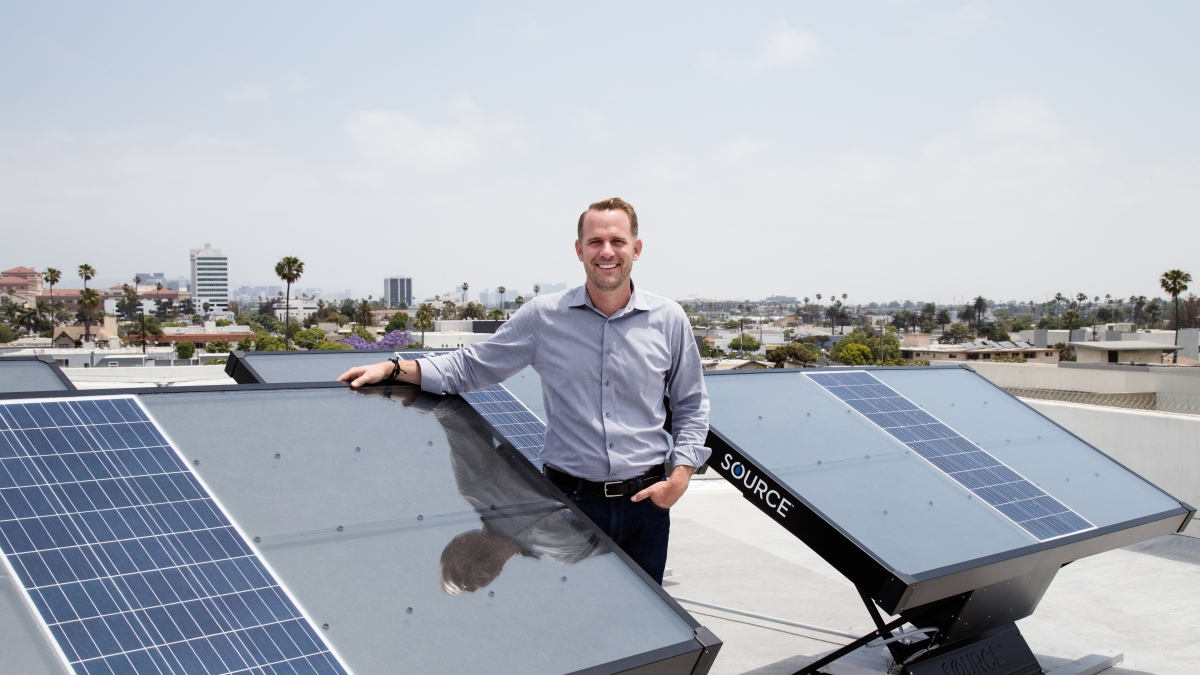Inventions for developing world lead to Lemelson-MIT Prize for ASU engineering professor

ASU Associate Professor Cody Friesen has earned the 2019 $500,000 Lemelson-MIT Prize for inventing solutions to address two of the biggest challenges in the developing world: access to fresh water and reliable energy. Photo courtesy of Zero Mass Water
Dedication to inventing solutions for social and economic advancement in the developing world has earned Cody Friesen, associate professor of materials science and engineering at Arizona State University and founder of Zero Mass Water, the 2019 $500,000 Lemelson-MIT Prize for invention. The award honors outstanding inventors who translate their ideas into technological inventions that have been adopted and bring significant value to society.
Through his company Zero Mass Water, Friesen is using water and energy technologies to help address the global water crisis. He invented SOURCE Hydropanels — solar panels that use powerful desiccants to generate drinking water from sunlight and air. The technology can make drinking water in conditions with relative humidity as low as 5% and requires no electricity.
SOURCE has been developed in 33 countries across six continents and is a powerful resource in areas with little to no infrastructure and where water delivery is paramount. The Hydropanels are providing clean drinking water in communities, refugee camps, government offices, hotels, hospitals, schools, restaurants and homes around the world.
“As inventors, we have a responsibility to ensure our technology serves all of humanity, not simply the elite,” said Friesen. “At the end of the day, our work is about impact and this recognition propels us forward as we deploy SOURCE Hydropanels to change the human relationship to water across the globe.”
With more than 100 active patents and 42 granted patents so far in his career, Friesen joins an impressive lineage of inventors to receive the Lemelson-MIT Prize. He is the first winner of the prestigious award from Arizona State University, the nation’s top-ranked university for innovation. Friesen credits much of his success to the support he has been given as a faculty member of the Ira A. Fulton Schools of Engineering.
"As both an engineer and entrepreneur, the Fulton Schools of Engineering uniquely provides an environment to research and grow technologies into real solutions," said Friesen. "The foundational work we did on Hydropanels happened at ASU."
With 24 startups and 192 patents in the last three years alone, the Fulton Schools of Engineering has a strong record of innovation and creativity among its world-class faculty.
“Cody has cultivated a unique path as professor and entrepreneur to build an impressive record of bringing to market solutions to some of the planet’s most pressing challenges,” said Kyle Squires, dean of the Fulton Schools of Engineering. “His motivation to make translational impacts while mentoring the next generation of entrepreneurs and engineers typifies the innovative spirit we value in our faculty, and is a testament to why he is deserving of this incredible achievement.”
The Lemelson-MIT Prize is the largest cash prize for invention in the United States. Friesen will donate the $500,000 prize to a Zero Mass Water project with Conservation International to provide SOURCE Hydropanels to the Bahía Hondita community in Colombia.
“Cody Friesen embodies what it means to be an impact inventor,” noted Carol Dahl, executive director at the Lemelson Foundation. “His inventions are truly improving lives, take into account environmental considerations and have become the basis for companies that impact millions of people around the world each year. We are honored to recognize Dr. Friesen as this year’s LMIT Prize winner.”
Friesen will speak at EmTech MIT, the annual conference on emerging technologies hosted by MIT Technology Review at the MIT Media Lab, on Wednesday, Sept. 18, at 5 p.m.
More Science and technology

Applied Materials invests in ASU to advance technology for a brighter future
For nearly 60 years, global giant Applied Materials has been hard at work engineering technology that continues to change how…

Meet ASU engineering students who are improving health care, computing and more
Furthering knowledge of water resource management, increasing the efficiency of manufacturing point-of-care health diagnostic…

Turning up the light: Plants, semiconductors and fuel production
What can plants and semiconductors teach us about fuel production?ASU's Gary Moore hopes to find out.With the aim of learning how…

